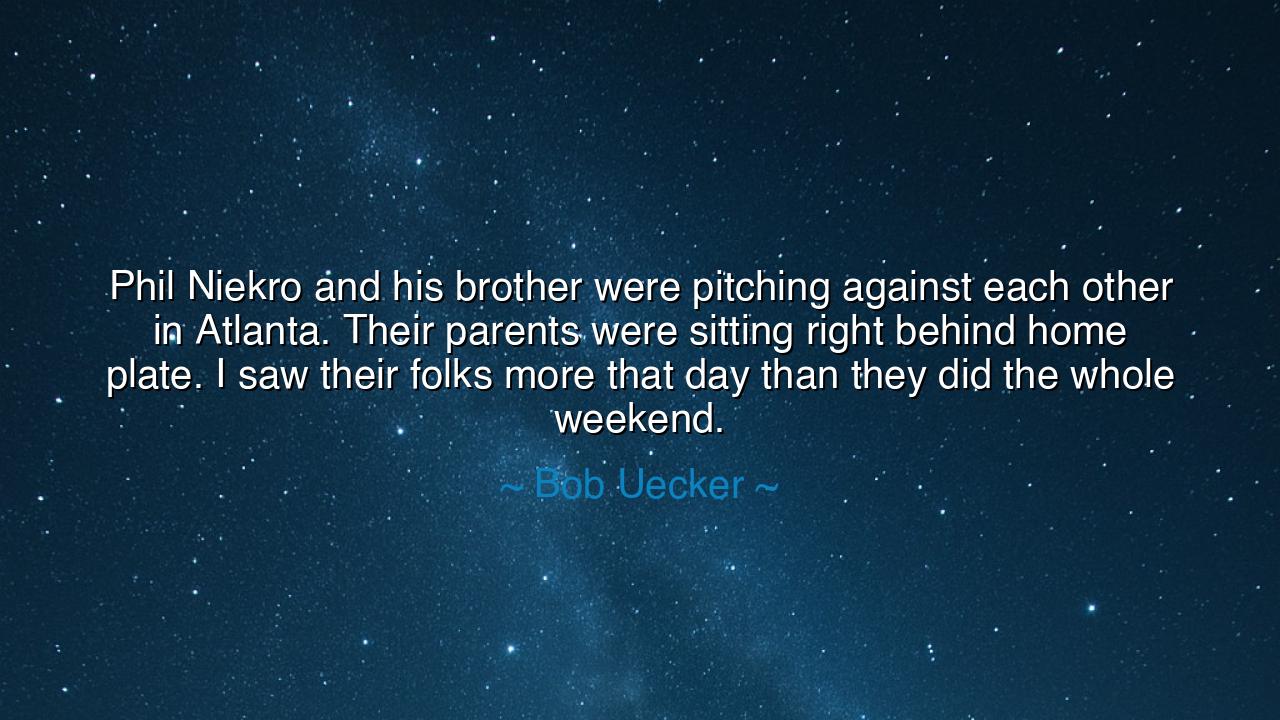
Phil Niekro and his brother were pitching against each other in
Phil Niekro and his brother were pitching against each other in Atlanta. Their parents were sitting right behind home plate. I saw their folks more that day than they did the whole weekend.






In the warm and humorous words of Bob Uecker, catcher, storyteller, and poet of the ballpark, there lies a truth that shines far beyond the game: “Phil Niekro and his brother were pitching against each other in Atlanta. Their parents were sitting right behind home plate. I saw their folks more that day than they did the whole weekend.” Though spoken in jest, this quote carries within it the tenderness of family, the irony of destiny, and the bittersweet distance that often accompanies greatness. Beneath the laughter is a parable about devotion, duty, and the unseen cost of pursuing excellence.
The tale itself is true and simple. Phil Niekro, the master of the knuckleball, and his brother Joe, also a fine pitcher, once faced each other in a Major League Baseball game. Their parents, who had nurtured both sons from sandlot to stadium, sat behind the plate—so near they could see every motion of their boys, yet so far that their children, locked in the solemn art of competition, could not return their gaze. It was a moment both glorious and bittersweet: the triumph of a family whose name had reached the heights of sport, and yet a scene marked by the quiet truth that success often requires separation.
Bob Uecker, who was both a witness and a wit, transformed this tender moment into humor. Yet behind his laughter, one senses reverence—for the parents who watched in pride and longing, and for the brothers, who fulfilled their destiny but could not embrace it together. It is an image that echoes the ancient world, where heroes, in their striving for glory, often found themselves divided from those they loved most. Just as Achilles, bound to his fate, could not return home to his father’s embrace, so too the Niekro brothers, though united in blood, found themselves on opposite sides of the same field.
In this way, the quote speaks to a universal truth: that every act of greatness carries a cost, and that the road of mastery often winds away from the hearth. The parents who sit behind the plate—metaphorically or otherwise—are the silent witnesses to our becoming. They give us life, they guide our first steps, and then they watch from a distance as we strive, struggle, and sometimes oppose one another in the great game of life. The love remains, but it becomes something watched rather than shared, something that must endure across the distance of duty.
And yet, there is beauty in this distance. For though the brothers could not turn to see their parents, their parents could see both. From where they sat, they held the whole picture—the unity of their sons even in opposition. This is the divine perspective that love alone grants: to see beyond the contest, beyond the lines of rivalry, into the deeper truth that all struggle within a family is part of a single story. The Niekros were not divided that day—they were two halves of the same devotion, two fruits from the same tree, shining in the light of their parents’ pride.
Bob Uecker’s humor, then, becomes a form of wisdom. It reminds us that even amid laughter, there is longing; that even amid success, there is solitude. The same is true in all walks of life. A mother watches her child leave for war, or for college, or for a distant career, and she smiles, though her heart aches. A father watches his daughter take the stage, proud and distant, knowing she has outgrown the small world he once ruled. These moments are our modern ballparks—the places where love learns to stand behind the plate, watching and cheering, unseen but essential.
So, let this be the lesson: honor those who sit behind the plate in your life—those who raised you, supported you, and now watch from afar as you play your part in the world. Remember that their pride is mingled with silence, their joy with yearning. And if ever you find yourself on the field of victory, take a moment to look back, if you can—to see the faces that first believed in you.
For, as Uecker so playfully reminds us, we may spend our lives throwing and catching across the vast diamond of fate, but somewhere, always, there is someone watching with love. The game may divide us for a moment, but the home—the true home—remains in their gaze. And one day, when the game is done, we shall return to that home at last, and embrace those who waited in quiet pride through every inning of our becoming.






AAdministratorAdministrator
Welcome, honored guests. Please leave a comment, we will respond soon